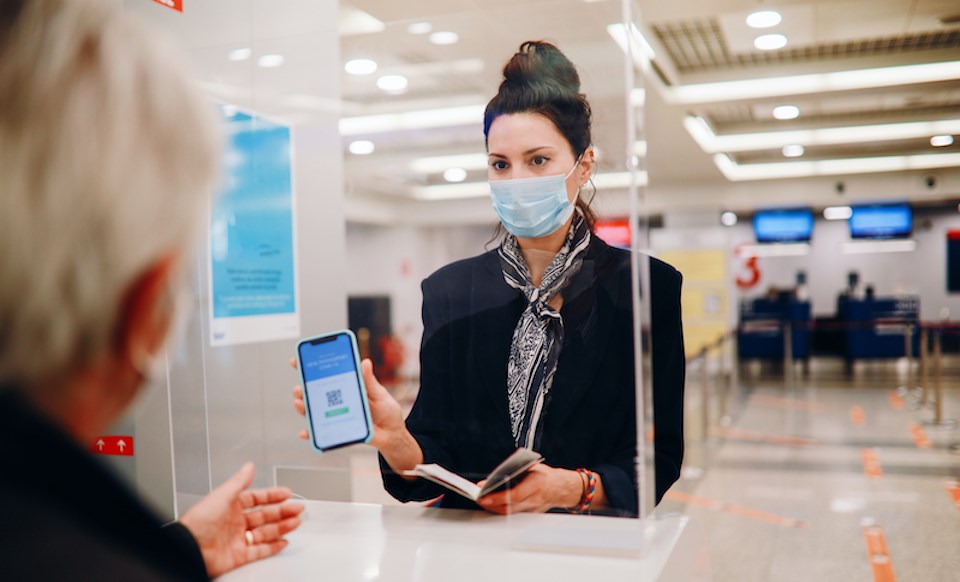Travellers may now use a rapid coronavirus test to gain entry to Canada—but there are several things to consider before you pack your bags.
Effective Monday (Feb. 28), all fully vaccinated travellers to Canada may use proof of a negative rapid COVID-19 test instead of a PCR test to gain entry to the country.
Children under five years of age and people who are exempt, such as , do not have present proof of a negative test result.
The Government of Canada has also adjusted the travel health notice from level three to level two. As a result, travellers are no longer recommended to avoid all travel for non-essential purposes. That said, they should consider the availability of medical services in a foreign country, and plan for the potential high costs associated with medical treatment and extending their trip, should they test positive for COVID-19 while abroad.
Travellers must also understand that there is a continued risk that border and travel measures in other countries, as well as in Canada, may change while they are abroad and should regularly review the entry requirements and exemptions for their travel situation.
What to know about using a rapid antigen test as proof
While travellers may use proof of a negative COVID-19 rapid antigen test, they have a shorter window of time to take the test prior to departure. Further, not all rapid tests will be accepted as proof.
- Rapid tests must be administered no more than one day before your scheduled flight or entry to Canada by land or water. However, this window is not contingent on the time that your flight leaves. In other words, if you have a 3 p.m. flight on a Friday, proof a test taken at any time on Thursday or Friday before your Friday will suffice.
- The test must be professionally administered at a pharmacy or laboratory or "observed" — meaning that a health care professional observes the test via a telehealth option. A test that you perform unobserved will not meet the requirement.
- The test must be authorized for sale or distribution in Canada or in the jurisdiction in which it was obtained.
- The test must be performed outside of Canada in the destination you are arriving from.
Why you might still want to show proof of a negative PCR test and how to administer it
For travellers who have to make a connecting flight, or for those who have an altogether lengthy travel time, Transport Canada recommends that you use proof of a negative PCR test since the test result needs to be timed for your flight.
- Your test has to be timed for the scheduled departure time of your final flight that lands in Canada. For example, if your flight is scheduled to leave at 11:00 a.m. on Friday, your test must have been taken any time after 10:59 a.m. on Tuesday.
What happens if my flight is delayed?
If your flight is delayed by the airline, your negative COVID-19 molecular test can be used for up to an additional 24 hours (to a maximum of 96 hours) from the scheduled departure time. If the delay causes your test to be more than 96 hours old, you’ll need to be retested.
If you took a rapid test, your result can be used for up to an additional 24 hours from the scheduled departure time. If the delay causes the test result to be more than 24 hours past the one-day limit, you’ll need to be retested.
There are no extensions to the time limit for your pre-entry test if the airline cancels your flight. If your new scheduled flight is not within the time limit for your test, you’ll need to be retested.
Can I still use proof of a previous COVID-19 infection to meet entry requirements?
You may use proof of a positive molecular COVID-19 test but a rapid antigen test will not be accepted as proof.
- You must no longer have symptoms of the virus.
- The test must have been taken at least 10 calendar days and no more than 180 calendar days before entering Canada.
Arriving by land or sea
You must take your pre-entry test outside of Canada based on the time you arrive at the land border or marine port of entry. The test requirements are similar to those for flight arrivals, meaning that a negative molecular test is valid if taken outside of Canada within 72 hours of arrival. A negative antigen test result is valid for one day prior to arrival.
How to show proof of COVID-19 tests
When you arrive at the border, you must present a valid negative test result (paper or electronic proof) or proof of a previous positive molecular test result taken at least 10 calendar days and no more than 180 calendar days before entering Canada. Counting starts the day after your test.
The proof must include:
- traveller name and date of birth
- name and civic address of the laboratory or testing provider that administered or professionally observed the test
- the date on which the test was taken
- the type of test taken
- the test result
Keep proof of your test results with you for the 14-day period that begins on the day you enter Canada.
ArriveCAN App remains in place
All travellers, regardless of how long they were away from Canada, continue to be required to submit their mandatory information via ArriveCAN (free mobile app or website), including proof of vaccination and a quarantine plan prior to arriving in Canada.
Find out how to use the app with Vancouver Is Awesome's .



